This might seem to be a strange cake with which to welcome your son into the world, but bear with me.
Some weeks ago, I tried a sample of this tea, which was kindly provided by "twodog" of the curiously-named new outfit, white2tea. This is rapidly becoming one of my favourite places to buy very decent, and very decently-priced, cakes made within the last five years. Twodog has a great eye for a bargain, and has an inventory which is a mix of Danzhen / Taochaju cakes from my friend Xiao Yunqing in Maliandao, and true bargain cakes that he has encountered along the way: you might remember the excellent 2006 Tiandiren "Bulangshan" and the 2007 Wild Elephant.
This cake is just twelve of your American bucks, at the time of writing, which is not a very large sum of money. The cake hits all the wrong/right notes: it has a name loosely based on Menghai - and its wrapper, in English at the bottom, even states "Menghai Tea Co. Ltd."! Note that the Chinese characters give the actual name: "Menghai Banzhang Chaye" [tea leaf]. Cheeky.
It has a Douji-esque style sticker on the back which is ab-so-lutely impossible to remove cleanly. My wrapper is now almost entirely shredded as a result of my clumsy fingers / sharp pu'erdao trying to gain ingress.
Pictured above, the story continues: the cake appears to be something of a "shaggy dog", and it has plentiful loose leaves rattling around in the wrapper as a result. "Worried it's going to suck", as a famous poet once wrote.
However, I'm not at all worried, because the sample that I previously tried had no suction whatsoever. I take some fresh leaves from the cake with confidence, and enjoy the strong, sweet scent.
Mother and baby are asleep upstairs, while Xiaohu is currently out with his grandmother. I prepare myself to enjoy, for the first time in quite a while, a guilt-free session.
This cake is something of a steamroller: ones expectations are lowered by the rancid appearance and minor label, until it smacks one upside the heed (sic) with its potent mix of aggressive sweetness and solid kuwei [good throaty bitterness]. While my eyes begin to widen, I remember that this is indeed a Bulangshan cake, and it does have the same raw power for which that region has become famous.
"Bulangshan" is actually a very large area, comprising many peaks, and so it is a little disingenuous to write about a terroire; that said, many of the "Bulangshan" cakes I have had in the past have hit like the proverbial articulated lorry.
This is not the emphemeral sweetness of a floral nature, that will be gone within a year or two: this is pinewood sweetness, embedded in the base of the tea - the kind that deepens and improves with age. The pronounced punchiness also endears itself to me, because such cakes seldom "go quiet" - at least, those I have in my collection have retained their face-searing charm.
This isn't a complex cake, but it's power and sweetness keep me coming back, and retain my interest in a way that some much more expensive cakes somehow fail to do. It is smooth, long-lasting in the throat, and... well, it's really rather good. For a mere $12, you have to be thankful that comedy outfits such as the Menghai Banzhang Chaye Tea Company exist, because their products are always going to be underpriced and, if they continue hitting the right notes in the right order, as with this cake, then I'll be patiently watching.
Thanks again to twodog for introducing me to this humble, yet brutal, little fellow. Now, it's time for me to make some more Chinese soups for my slumbering wife...

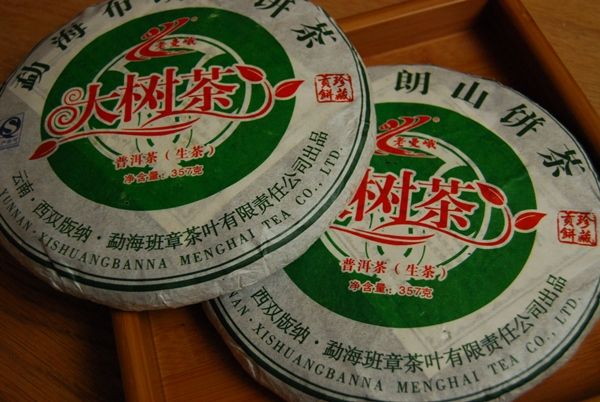
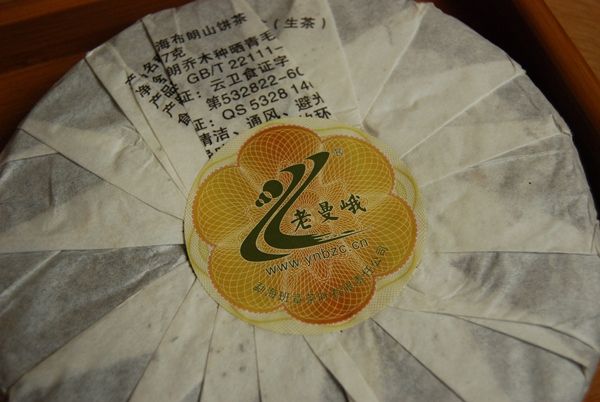
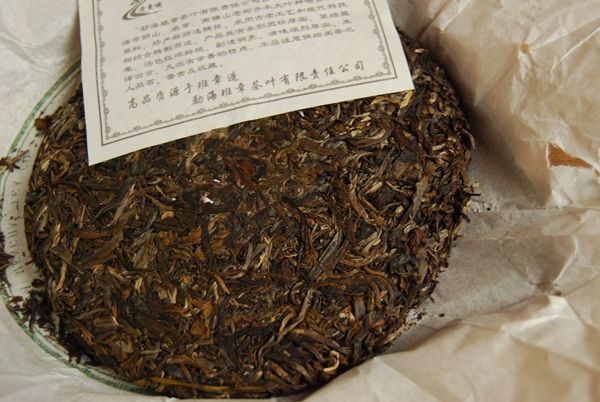
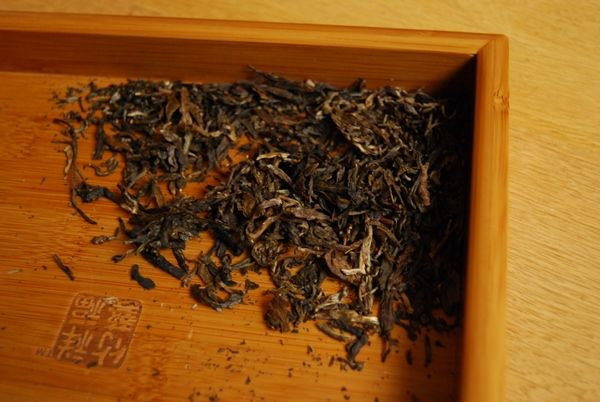
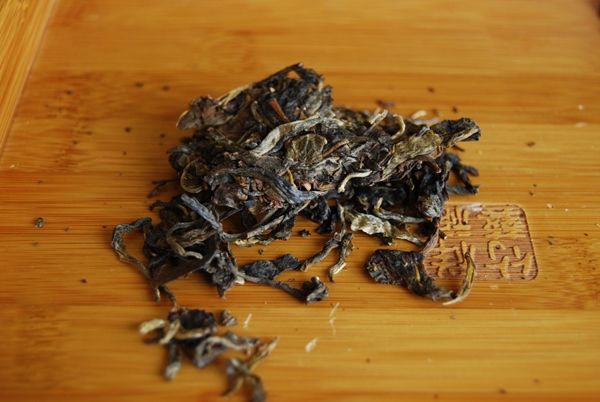
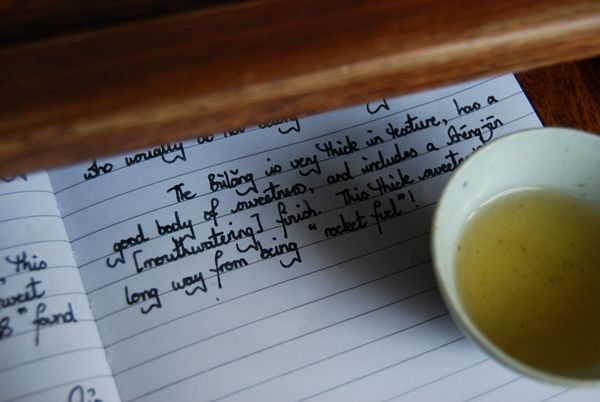
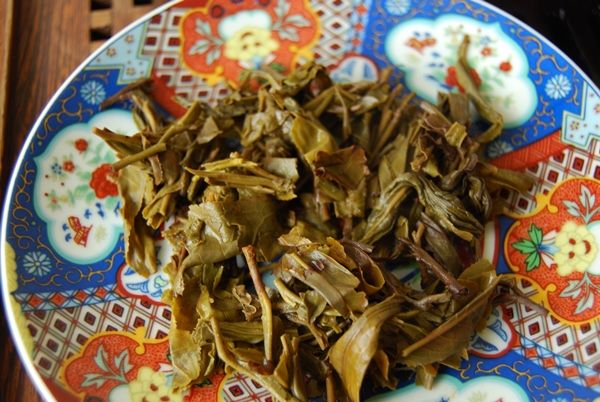
7 comments:
OOoooohh, my sample was pretty much a bust for me. Reading notes said that the flavor was hollow and not very interesting, and that it lacked bitterness. Said I thought that it was overroasted or something. Took out that one gram that's still left in the packet and sniffed--still smells like proper tea. I would have liked it if my sample had been aggressive. C'est la vie, like the new kid.
Lacked bitterness? :)
I wonder what happened to your sample! You never know...
Toodlepip,
Hobbes
Those stickers are "pain in the cake" aren't they? :) Thanks for the white2tea tips.
By the way, did you notice how they wrote Laoman'e (老曼峨) on the back of the cake, on that sticker logo and up above on the front in red? I am not sure whose coattails they are trying to ride exactly. They manage to work in "menghai, banzhang, and laomane" all on a single wrapper, for a tea from bulang. This is kind of a funny cake, but I agree with your assessment - good potency.
Best,
Twodog
They really did milk every inch of space on the wrapper. :)
It is best not to judge the book by its cover, in this instance!
Toodlepip,
Hobbes
Indeed, I can not imagine anyone lacking bitterness in this one.
I quite like it (it sort of reminds me of the good version of Longfeng Bulang; humbler in thickness and cooling, but with better huigan). If the pinewood/tobacco does not turn into ugly sort of smokiness throughout the aging, it could be a very pleasing tea, after some years.
Even though I can't say I'd enjoy every bit of it, it sure keeps attention.
I do like what that factory does (despite its funny name). Their tuos (2007 Banzhang and 2008 Menghai) are another worthwhile teas for good money.
Best,
Jakub
Dear Jakub,
I'll keep my eyes open for their other teas that you mentioned. :)
Toodlepip,
Hobbes
Post a Comment